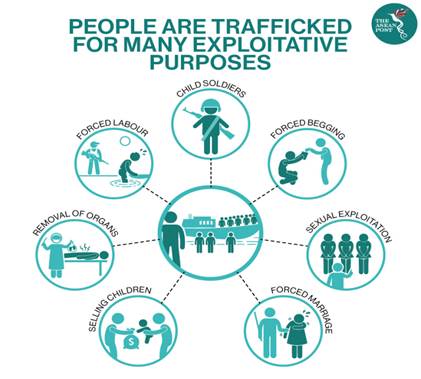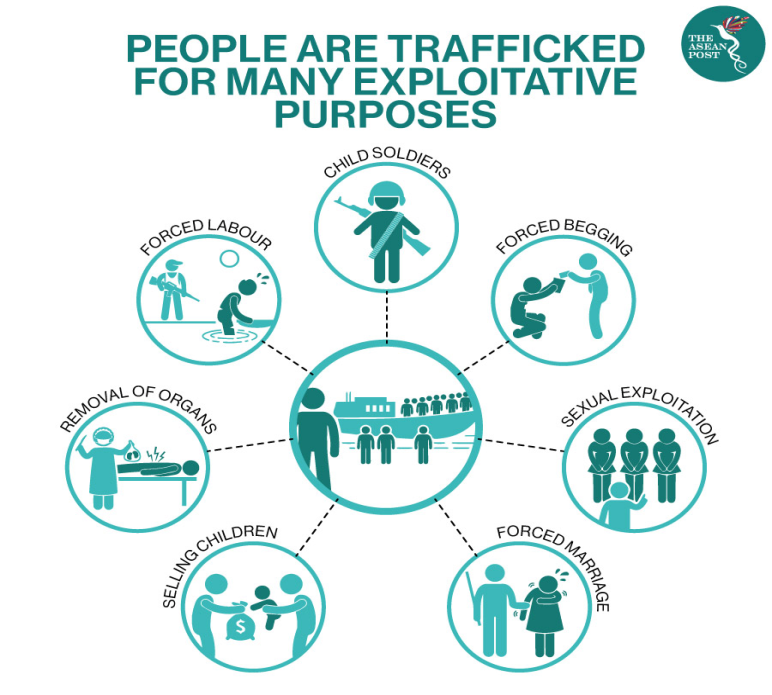Description

Copyright infringement not intended
In News
- The National Commission for Women has organized a seminar on Anti Human Trafficking Awareness.
- It was organized with the support of the Bureau of Police Research and Development.
- The session discussed;
- The introduction, concept, patterns, and existing response systems against human trafficking.
- The psycho-sociological impact of human trafficking.
- Role of civil society organizations in preventing human trafficking.
Human Trafficking
- Human trafficking is defined as the forceful exploitation of a person.
- It is the trade of humans for forced labour, Prostitution, etc.
- According to the data released by National Crime Records Bureau, the highest numbers of persons were trafficked for forced labour, followed by prostitution.
Root Causes of Human trafficking
- The Reasons behind increasing trafficking vary from country to country and often differ from one country to another.
- Social, political, economical, cultural and other factors play a key role in Promoting Trafficking. Women and children are extremely vulnerable to trafficking.
- Socio-economic conditions like poverty, caste discrimination or violence, lack of economic opportunity, Political violence, Climate change, and natural disasters influence trafficking. Displacement of populations increases their vulnerability to becoming a victim of trafficking.
- Increasing penetration of broadcast and telecommunication services and social media in rural areas has increased the desire of people to migrate to the city and, with that; they are becoming easy targets for traffickers.
- In Some Poor families, Parents sell their children due to their weak financial condition, and also in the hope that their children would get a better standard of living and more opportunities in life.
- Other factors like porous borders, corruption among Government officials, and weak enforcement of Anti-trafficking laws.
Major Steps by Government
- The government enacted the Immoral Traffic (Prevention) Act, of 1986 to deal with trafficking for sexual exploitation.
- Bonded Labour Regulation Act, 1986 and Child Labour Regulation Act, 1986 deal with the exploitation of bonded labour.
- India is part of the United Nations Convention Against Transnational Organized Crimes, and its Protocol to Prevent, Suppress and Punish Trafficking.
- The Trafficking of Persons (Prevention, Protection and Rehabilitation) Bill, 2018 was introduced in Parliament. It contains provisions for the prevention, rescue, and rehabilitation of trafficked persons.
- The Union government created a National Anti-Trafficking Bureau to monitor the investigation of cases at the national level.
Way Forward
- Human Trafficking is an organised crime and operated across domestic and international borders, the nature of the crime needs strong cooperation and intelligence sharing between different investigating agencies.
- Steps must be taken for the socio-economic development of potential victims to reduce their vulnerability.
- Focus on improving children’s access to educational and vocational training, especially among girls and minority groups.
- Promoting job opportunities for women by supporting Self Help Groups (SHGs) and organizing training courses to empower them.
- Prohibiting the services provided through trafficked persons, like child labour, prostitution, etc.
- Need to ensure a minimum standard of living for all people, Strict Border control through proper fencing and regular patrolling, Prevent corruption in bureaucracy, etc, to curb the menace of trafficking.
- Steps should be taken to set up Protection Homes across the country, to provide shelter, food, counselling, and medical services to victims.
- Our development goals must include both economic development and social inclusion.
https://newsonair.gov.in/News?title=NCW-organizes-one-day-seminar-on-Anti-Human-Trafficking-Awareness&id=443251
1.png)
https://t.me/+hJqMV1O0se03Njk9













